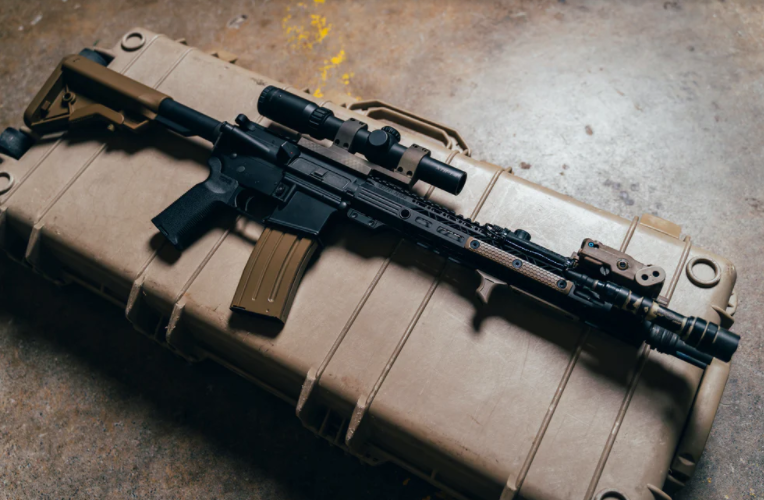 Gun laws are designed to regulate gun use in the United States, but what’s tricky is that each state has its own laws.
Gun laws are designed to regulate gun use in the United States, but what’s tricky is that each state has its own laws.
Meaning, if you’re licensed in one state, it won’t count in another. So, one downside to having a gun is that, wherever you’re going, you’ll need to know the rules, otherwise you might put yourself at risk, legally speaking. Because there are too many states and too many laws to cover and memorize, here are the main differences you’ll need to keep in mind when moving from one state to another with your firearm.
Handguns Vs Long Guns
One of the main differences between state gun laws is how handguns and long guns are viewed in the eyes of the law. Some states, like Alabama and Alaska, choose to treat both equally in all categories, from concealed carry permits to mandatory background checks upon purchase. Meanwhile, other states, like Hawaii and Indiana, have different laws for handguns and long guns. In Hawaii, there is a magazine limit for handguns, but not long guns. In Indiana, you don’t need a permit to open carry a long gun, but you need one to open carry a handgun. If your state has similar differences, make sure you’re aware of them before you make your purchase.
Owner License
Most states do not require an owner’s license, but a few do. Columbia and Massachusetts require an owner’s license for both handguns and long guns. Meanwhile, New York only requires a license for handguns. Guam and Puerto Rico, while not states are considered U.S. territories and they require an owner’s license, too. Before you buy your gun, you’re required to have an owner’s license. To start the application process, download the form from your state’s website, then fill it and send it by mail. You’ll also need to pay a fee, as well as, complete a safety course (if required). Depending on the state, they may request additional information. The approval process can take up to four months, depending on the state and the amount of research your case requires.
Open Carry Vs Concealed Carry
There are a lot of different stances when it comes to open and concealed carry. First of all, open carry means that you can carry your gun with you anywhere without hiding it. Concealed carry means that you can’t visibly carry your gun, but you can carry it nonetheless. In certain states, California to be specific, the laws are a bit unclear. To concealed carry, you need a license, unless you believe you are in grave danger. Of course, the interpretation of danger can vary from one person to another, but this won’t help if you’re arrested with a gun. If you do face any trouble, and preferably before you do, take the time to consult Second Amendment lawyers on the matter as they know all there is to know about gun laws. As for open carry in California, it’s not permitted, unless in certain counties where you’ll need a license issued by the county sheriff, but that’s only in places where the population is under 200,000. However, county permits aren’t recognized outside county limits. Again, if you’re unsure, ask a professional before you do anything.
On a brighter note, states like Arkansas, Colorado, and Connecticut have very clear open and concealed carry laws when it comes to both, handguns and long guns.
Do you need to Register Your Firearm?
Firearm registration can often be quite a hassle, requiring you to free up some time to schedule an appointment, file an application, and go to your local police station for identity verification and fingerprint submission, as well as, firearm inspection. The procedures differ from a state to another, so you’ll need to call the state’s firearms department or go to their website to get more information. The good news is, as of 2021, only eight states and the District of Columbia, require firearm registration. These states are California, New Jersey, New York, Washington, Connecticut, Michigan, Maryland, and Hawaii. So, unless you’re planning on visiting any of these states, you don’t need to register your gun once you arrive.

Now that we’ve covered the ways in which most state laws differ, you should have a better idea of what to expect. Nevertheless, it is important that you do your research on the state you want to know more about. Go through their website, call their firearms department, or talk to a specialized local lawyer. If there is anything you don’t fully understand, ask about it as much as you want. Knowledge is power, and in this case, safety, too.
Become a Harlem Insider!
By submitting this form, you are consenting to receive marketing emails from: Harlem World Magazine, 2521 1/2 west 42nd street, Los Angeles, CA, 90008, https://www.harlemworldmagazine.com. You can revoke your consent to receive emails at any time by using the SafeUnsubscribe® link, found at the bottom of every email. Emails are serviced by Constant Contact








